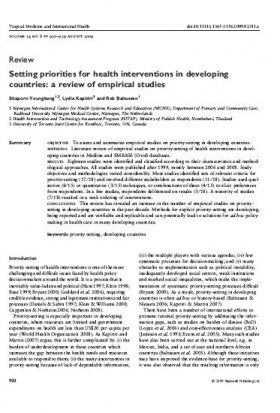This website uses cookies so that we can provide you with the best user experience possible. Cookie information is stored in your browser and performs functions such as recognising you when you return to our website and helping our team to understand which sections of the website you find most interesting and useful.
Setting priorities for health interventions in developing countries: a review of empirical studies. (2009)

รายละเอียดเพิ่มเติม
Setting priorities for health interventions in developing countries: a review of empirical studies.
Sitaporn Youngkong 1,2 Lydia Kapiriri 3 Rob Baltussen 1
1 Nijmegen International Center for Health Systems Research and Education (NICHE), Department of Primary and Community Care, Radboud University Nijmegen Medical Centre, Nijmegen, The Netherlands
2 Health Intervention and Technology Assessment Program (HITAP), Ministry of Publich Health, Nonthaburi, Thailand
3 University of Toronto Joint Centre for Bioethics, Toronto, ON, Canada
Summary
Objective To assess and summarize empirical studies on priority-setting in developing countries.
Methods Literature review of empirical studies on priority-setting of health interventions in developing countries in Medline and EMBASE (Ovid) databases.
Results Eighteen studies were identified and classified according to their characteristics and methodological approaches. All studies were published after 1999, mostly between 2006 and 2008. Study objectives and methodologies varied considerably. Most studies identified sets of relevant criteria for priority-setting (17/18) and involved different stakeholders as respondents (11/18). Studies used qualitative (8/15) or quantitative (3/15) techniques, or combinations of these (4/15) to elicit preferences from respondents. In a few studies, respondents deliberated on results (3/18). A minority of studies (7/18) resulted in a rank ordering of interventions.
Conclusions This review has revealed an increase in the number of empirical studies on priority-setting in developing countries in the past decade. Methods for explicit priority-setting are developing, being reported and are verifiable and replicable and can potentially lead to solutions for ad hoc policy-making in health care in many developing countries.
Link: http://onlinelibrary.wiley.com/doi/10.1111/j.1365-3156.2009.02311.x/full




